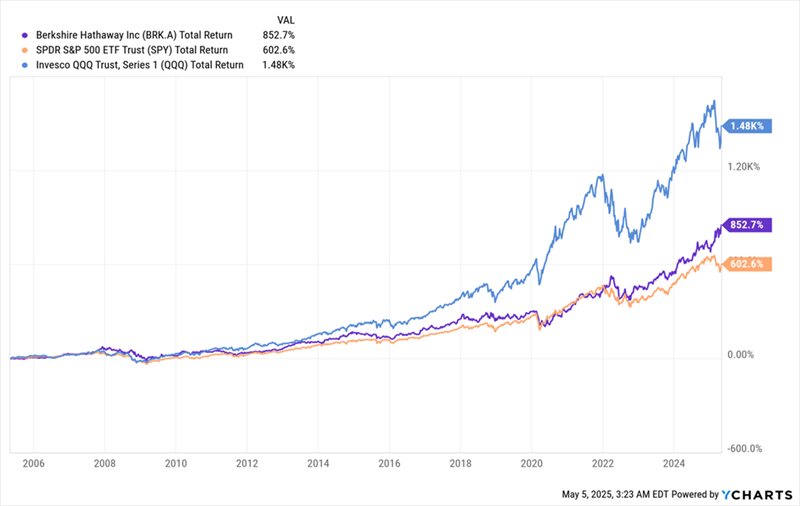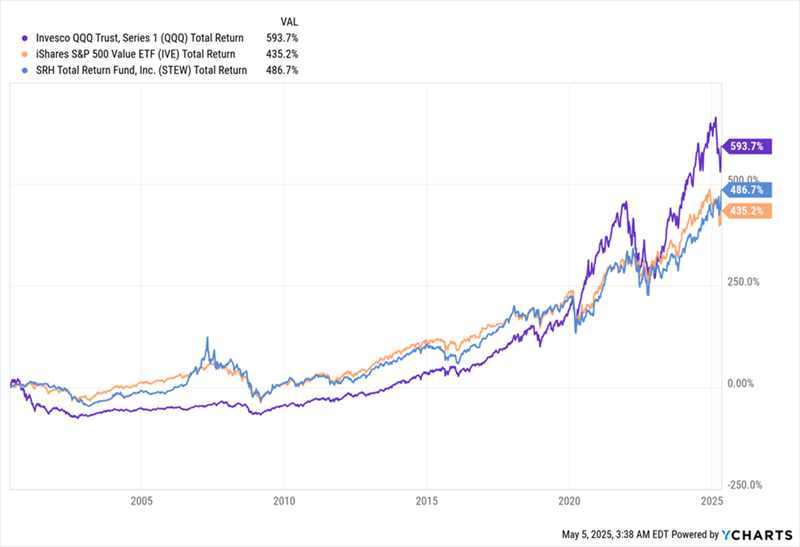How You Can Beat Buffett’s 19.9% Yearly Returns and Get Paid Monthly
Contrarian Outlook | May 08, 2025 12:15PM ET
Can you and I beat the legendary returns of Warren Buffett? Absolutely. What’s more, we can do it while “translating” a slice of our gains into a big income stream (with special dividends on the table, too).
I’ll show you how in a moment.
First, we need to talk about how the 94-year-old Oracle of Omaha, who is now stepping back from the position of president and CEO of Berkshire Hathaway (NYSE:BRKa) , has changed the course of investing over the years.
Every year, as you likely know, Buffett releases a simple letter to investors showing what’s happened with Berkshire’s portfolio. While there have been a few lean years, his outperformance is astounding: a 5,502,284% return on every dollar invested at the start of his 60-year career.
That amounts to a 19.9% annualized gain, nearly double the S&P 500’s 10.4% in that time.
That gap is impressive enough, but compounding makes it a difference of millions of percent. This just proves one of Buffett’s main arguments: One needs to stay in the market, patiently outlasting all the short-term panics (like the recent tariff hysteria) and patiently buying when assets are oversold.
Second, it’s worth noting that stocks themselves did well in that time, with double-digit profits. That means retirement is more attainable than most people expect.
If you could turn, say, half of that 19.9% yearly return into income, you could score a healthy six-figure income stream by investing a little over a million dollars. That’s what that fund I mentioned off the top can do for us. We’ll talk about this off-the-radar ticker in just a few more seconds.
First, I do need to rain on Buffett’s parade a bit here: The truth is, most of his outperformance stems from the early years of Berkshire Hathaway’s operations.
Berkshire’s Strong—But Waning—Returns


Some quick numbers: Berkshire Hathway (shown in purple above) has had a 19.1% total annualized return over the last 45 years, as we just discussed. But over the last 20 years, its return has slipped to 11.9% annualized, just ahead of 10.2% from the S&P 500 (in orange above). It’s also less than the NASDAQ 100, in blue, at 14.8%.
In fact, since the 2000s the tech- (and growth-) focused NASDAQ 100 has beaten both the S&P 500 and the value-investing strategies of Mr. Buffett.
We can clearly see that in the performance of the NASDAQ 100, shown through its main index fund in purple below. The NASDAQ has easily outrun the value-focused iShares S&P 500 Value ETF (NYSE:IVE), in orange below.
The most “Buffett-like” closed-end fund (CEF), the SRH Total Return Fund (NYSE:STEW), in blue, has also been dusted by the tech-heavy NASDAQ. STEW invests half its assets in Berkshire and the rest in Buffett favorites like JPMorgan Chase (NYSE:JPM).
NASDAQ 100 Outruns “Buffett-Like” Funds


A key thing to note about this chart is that the NASDAQ 100’s outperformance has been accelerating. That’s because it’s tilted toward tech, and our economy is becoming more tech-focused. So tech stocks will likely rise more than those favored by value investors over the long haul.
A CEF That “Translates” Buffett-Beating Gains Into Income
That’s the perfect segue into the CEF I want to spotlight today, the Columbia Seligman Premium Technology Growth Fund (NYSE:STK). As you can see below, STK (in orange) outperformed Berkshire (in purple) over the last decade.
STK Tops the Oracle (NYSE:ORCL)
In fact, not only has STK outperformed, but it’s delivered a large slice of those gains as income. The fund yields 6.6% as I write this, and its normal payouts have stayed rock steady over the last decade. Plus, STK has paid out a lot of special dividends (the spikes below) that make its total yield to investors even bigger.
Source: Income Calendar
Even ignoring those special payouts, investors who stuck with STK over the last decade would now be enjoying a 9.8% yield on their original buy, since STK’s unit price has nearly doubled in that time. So they’d be getting a bit less $100,000 per year for every million dollars invested, again before we consider those special dividend payments over the years.
Will this continue? It depends whether tech will stop being a major part of our lives and whether Wall Street will forget the value-investing strategies Buffett espoused. I think you’ll agree that neither scenario is very likely.
Disclosure: Brett Owens and Michael Foster are contrarian income investors who look for undervalued stocks/funds across the U.S. markets. Click here to learn how to profit from their strategies in the latest report, "7 Great Dividend Growth Stocks for a Secure Retirement ."
Trading in financial instruments and/or cryptocurrencies involves high risks including the risk of losing some, or all, of your investment amount, and may not be suitable for all investors. Prices of cryptocurrencies are extremely volatile and may be affected by external factors such as financial, regulatory or political events. Trading on margin increases the financial risks.
Before deciding to trade in financial instrument or cryptocurrencies you should be fully informed of the risks and costs associated with trading the financial markets, carefully consider your investment objectives, level of experience, and risk appetite, and seek professional advice where needed.
Fusion Media would like to remind you that the data contained in this website is not necessarily real-time nor accurate. The data and prices on the website are not necessarily provided by any market or exchange, but may be provided by market makers, and so prices may not be accurate and may differ from the actual price at any given market, meaning prices are indicative and not appropriate for trading purposes. Fusion Media and any provider of the data contained in this website will not accept liability for any loss or damage as a result of your trading, or your reliance on the information contained within this website.
It is prohibited to use, store, reproduce, display, modify, transmit or distribute the data contained in this website without the explicit prior written permission of Fusion Media and/or the data provider. All intellectual property rights are reserved by the providers and/or the exchange providing the data contained in this website.
Fusion Media may be compensated by the advertisers that appear on the website, based on your interaction with the advertisements or advertisers.